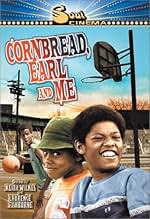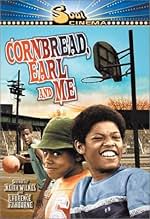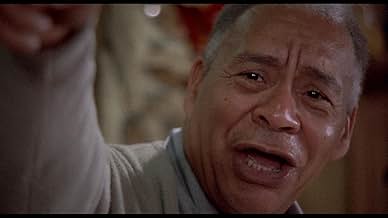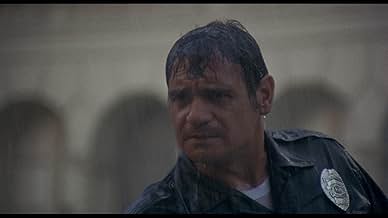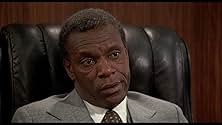IMDb-BEWERTUNG
6,9/10
1134
IHRE BEWERTUNG
Füge eine Handlung in deiner Sprache hinzuA 12-year-old is traumatised by the murder of his friend, a star basketball player.A 12-year-old is traumatised by the murder of his friend, a star basketball player.A 12-year-old is traumatised by the murder of his friend, a star basketball player.
- Regie
- Drehbuch
- Hauptbesetzung
Jamaal Wilkes
- Nathaniel 'Cornbread' Hamilton
- (as Keith Wilkes)
Laurence Fishburne
- Wilford Robinson
- (as Laurence Fishburne III)
Empfohlene Bewertungen
A kid witnesses the shooting death of the neighborhood basketball star. The basketball player had been mistaken by the police as a crime suspect. The kid is subjected to harrassment from the policement involved to keep quiet about what he knows. The cops even go so far as to intimidate his mother. This is an early film appearance of Lawrence Fishburne's. He was thirteen or fourteen when he did this movie. The always magnificent late Rosalind Cash plays his mother. The film makes a sharp comment about the conflicts people have with the very people who are supposed to be protecting them.
10Carrj145
I was very disturbed by the negative review given by a man who actually lived during the times dramatize in "Cornbread, Earl and Me." I am a 26-year-old Black female watching this movie for the first time. I found that every issue addressed in this movie is transcendent, relevant even today.
It amazes me that we overlook the importance of a message simply because of the delivery. In all fairness to this movie, there is no blaxploitation present; the language, attire, scenery, etc., everything necessary for a realistic plot, is perfect for the setting and time frame of this movie. Regarding the comment about "ghetto language" there is a balance between the use of the formal and informal in the movie.
As an English teacher, and one who has a strong disdain for negative images of African-Americans, I can honestly say that this movie's depiction of African-American life was very well done. It was also poignant and ahead of its time. It is movie that, when the time comes, I will show to my children as a reference to how very little times have changed regarding the ease of wrongful deaths, slandering of names, harassment of witnesses because of racial advantages, or rather disadvantages.
The movie is GREAT;-)
It amazes me that we overlook the importance of a message simply because of the delivery. In all fairness to this movie, there is no blaxploitation present; the language, attire, scenery, etc., everything necessary for a realistic plot, is perfect for the setting and time frame of this movie. Regarding the comment about "ghetto language" there is a balance between the use of the formal and informal in the movie.
As an English teacher, and one who has a strong disdain for negative images of African-Americans, I can honestly say that this movie's depiction of African-American life was very well done. It was also poignant and ahead of its time. It is movie that, when the time comes, I will show to my children as a reference to how very little times have changed regarding the ease of wrongful deaths, slandering of names, harassment of witnesses because of racial advantages, or rather disadvantages.
The movie is GREAT;-)
I think the label of blaxploitation for this film is quite unfair- it's heartfelt, various Black and White characters are shown as flawed rather than the "us vs. them" mentality of many racially charged films of that era- and you deeply care about what happens to everyone involved. Plus Moses Gunn is as fine an actor as ever set foot on the silver screen. Just thoroughly enjoyed it in spite of low budget feel and some clichéd moments. I even got choked up at times. Well worth seeing. Additionally, I was quite saddened to find that so many of the cast died relatively young. For a film from the mid 70s, there's an awful lot of actors in this movie no longer with us.
The film does have a moderately intriguing mesage about polkice brutality and political corruption being obscenely hoisted upon African American communities in the urban United States. That said, the film is horribly dated, and elements of it are unnacceptable by today's standards. I mean the slain icon's name is Cornbread for Pete's sake!!! Where wre his cohorts Fried Chicken and Watermelon? Moreover, the societal corruption is presented in a way that makes us feel sad and powerless rather than angry and indignant. This is really a product of the early seventies Blaxploitation genre that would be utterly offensive by today's standards were it not for the still relevant and timely subject matter of the film. Worthwhile viewing for those who can differentiate between the message and the overdone elements. I fear, however, that the film's excess could leave white biggots laughing at the maudlin African American stereotypes on parade rather than addressing the political concerns of the film at all.
Intermittently powerful, all-too-familiar social-problem realism and maudlin melodrama, "Cornbread, Earl and Me" is, either way, a melancholic affair. The overwrought histrionics, overly-optimistic resolution, and some poor acting are especially unfortunate given how moving the best scenes are here. The rainy killing by policemen and subsequent attack on those murderous officers by the neighborhood is a strong scene--ever more shockingly so as it comes after a dull first act. Moreover, it's well foreshadowed by prior unlawful actions by the cops in harassing and unwarranted searching of suspected criminals. The subsequent intimidation of witnesses leading up to the courtroom conclusion is in way familiarly spot on, too, as the police department and city officials close ranks to obstruct justice and protect their own, but it also often veers over-the-top, as does much of the rest of the picture.
Rather surprisingly given that they cast would-be NBA Hall-of-Famer Jamaal Wilkes that the basketball scenes, or single brief montage rather, are scant and unimpressive. It seems evident he wasn't cast for his acting abilities, after all, and is in good company there with other sports legends. (Not everyone is as fortunate as Wilkes's Lakers teammate Kareem Abdul-Jabbar, to be memorably cast in "Airplane!" (1980), and some face the far more reprehensible fate of appearing in a "Space Jam" burger (1996 and 2021).) The gee-wiz simplistic saintliness of Wilkes's "Cornbread" is of eye-rolling annoyance. And, those poor neighbors putting up with his dribbling a basketball in his flat on his way to an athletic scholarship. Either that apartment building was constructed with some of the best in sound-proofing floor and walls or those neighbors are unsung heroes.
Laurence Fishburne also made his debut here, and evidently he could act even as a child, or at least it seems that way by comparison to the actress, Rosalind Cash, playing his mother, who is the most prominent offender here of some very poor, soap-opera levels of acting (and, indeed, Cash's career ended with a role on daytime soap "General Hospital"). They should've cut the candy bar theft scene that results in her ridiculously weeping over her kid stealing 15 cents worth of merchandise. I get the point of the scene--everyone gets the obvious intent of it--to establish Wilford's, the "Me" protagonist of the title, maturing sense of ethics, but there are better ways to accomplish as much without constantly hitting the audience over the head with the cinematic equivalent of a sledge hammer. Perhaps, this is a product of its era, as much of the representation of African Americans on screen was in blaxploitation flicks, so subtlety doesn't seem to have been valued much, but this material was and is still is socially-relevant and powerful enough to do without the dramatic cop-outs.
Rather surprisingly given that they cast would-be NBA Hall-of-Famer Jamaal Wilkes that the basketball scenes, or single brief montage rather, are scant and unimpressive. It seems evident he wasn't cast for his acting abilities, after all, and is in good company there with other sports legends. (Not everyone is as fortunate as Wilkes's Lakers teammate Kareem Abdul-Jabbar, to be memorably cast in "Airplane!" (1980), and some face the far more reprehensible fate of appearing in a "Space Jam" burger (1996 and 2021).) The gee-wiz simplistic saintliness of Wilkes's "Cornbread" is of eye-rolling annoyance. And, those poor neighbors putting up with his dribbling a basketball in his flat on his way to an athletic scholarship. Either that apartment building was constructed with some of the best in sound-proofing floor and walls or those neighbors are unsung heroes.
Laurence Fishburne also made his debut here, and evidently he could act even as a child, or at least it seems that way by comparison to the actress, Rosalind Cash, playing his mother, who is the most prominent offender here of some very poor, soap-opera levels of acting (and, indeed, Cash's career ended with a role on daytime soap "General Hospital"). They should've cut the candy bar theft scene that results in her ridiculously weeping over her kid stealing 15 cents worth of merchandise. I get the point of the scene--everyone gets the obvious intent of it--to establish Wilford's, the "Me" protagonist of the title, maturing sense of ethics, but there are better ways to accomplish as much without constantly hitting the audience over the head with the cinematic equivalent of a sledge hammer. Perhaps, this is a product of its era, as much of the representation of African Americans on screen was in blaxploitation flicks, so subtlety doesn't seem to have been valued much, but this material was and is still is socially-relevant and powerful enough to do without the dramatic cop-outs.
Wusstest du schon
- WissenswertesLaurence Fishburne's film debut. He is credited as Laurence Fishburne III.
- PatzerWhen a clay pot is thrown at Officer Atkins and hits the windshield of his cruiser, it breaks. Pieces of glass hit Atkins and embed in his face. But windshields are made of safety glass and though windshields break, they keep the glass in place. So, the glass in this windshield would NOT have flown at Atkins, let alone embed in his face. He would have come out of this situation shaken but physically unharmed.
- Zitate
Wilford Robinson: ...they killed Cornbread and he wasn't doin' nothin'
[pause]
Wilford Robinson: all he was doin wuz jus goin' home...
- VerbindungenFeatured in Dusk to Dawn Drive-In Trash-o-Rama Show Vol. 2 (1996)
Top-Auswahl
Melde dich zum Bewerten an und greife auf die Watchlist für personalisierte Empfehlungen zu.
- How long is Cornbread, Earl and Me?Powered by Alexa
Details
- Erscheinungsdatum
- Herkunftsland
- Offizieller Standort
- Sprache
- Auch bekannt als
- Hit the Open Man
- Drehorte
- Produktionsfirmen
- Weitere beteiligte Unternehmen bei IMDbPro anzeigen
Box Office
- Budget
- 800.000 $ (geschätzt)
Zu dieser Seite beitragen
Bearbeitung vorschlagen oder fehlenden Inhalt hinzufügen

Oberste Lücke
By what name was Cornbread, Earl and Me (1975) officially released in India in English?
Antwort

